
OR today.
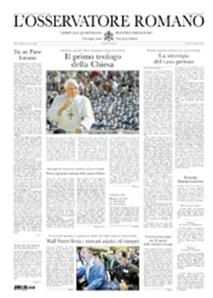
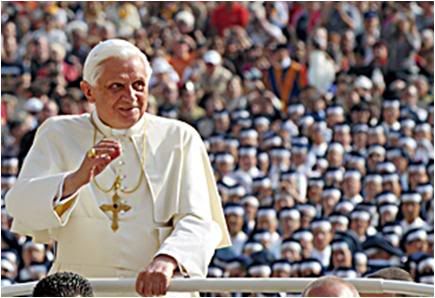
At the General Audience, Benedict XVI says all men are called on
to be the People of God and speaks of St. Paul as
'The first theologian of the Church'
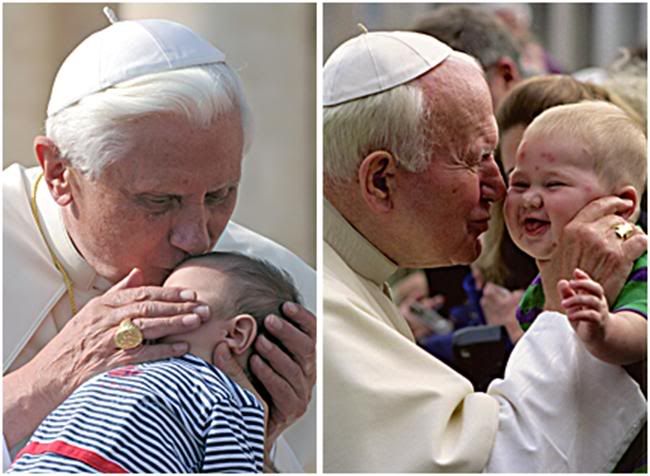 By coincidence or by choice, the OR has pictures of Benedict XVI and John Paul II kissing a baby - Benedict at yesterday's GA.
By coincidence or by choice, the OR has pictures of Benedict XVI and John Paul II kissing a baby - Benedict at yesterday's GA.
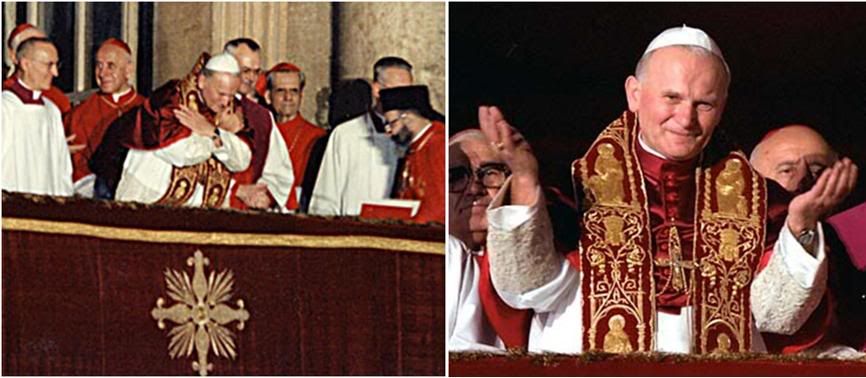
The Church today remembers John
Paul II on the 30th anniversary of his election as Pope.
OR has the ff items about him:
- A front-page editorial
- An interview with Cardinal Dsiwisz recalling that evening of October 16, 1978
(translations of the editorial and the Dsiwisz interview have been posted in REMEMBERING JOHN PAUL II)
- an interview with Cardinal Deskur, JP-II's good friend
whom he visited in a Rome hospital two days after he became Pope;
- Cardinal Ruini's recollections of John Paul II's parish visits as Bishop of Rome (Preface to a book about
those diocesan activities)
- a tribute from a secular Jew, Arrigo Levi, who is a cionsultant to President Gorgio Napolitano
- and an interview with Gianfranco Svidercoschi, former deputy editor of OR,
who co-wrote Cardinal Dsiwisz's 'My Life with Karol' and
has insightful things to say about John Paul II and the media.
Also on Page 1: A commentary by Lucetta Scaraffia on a very actual issue of eugenics:
a baby boy was embryo-selected and conceived in Spain for the express purpose
of providing stem cells to cure an older brother of a genetic disease.
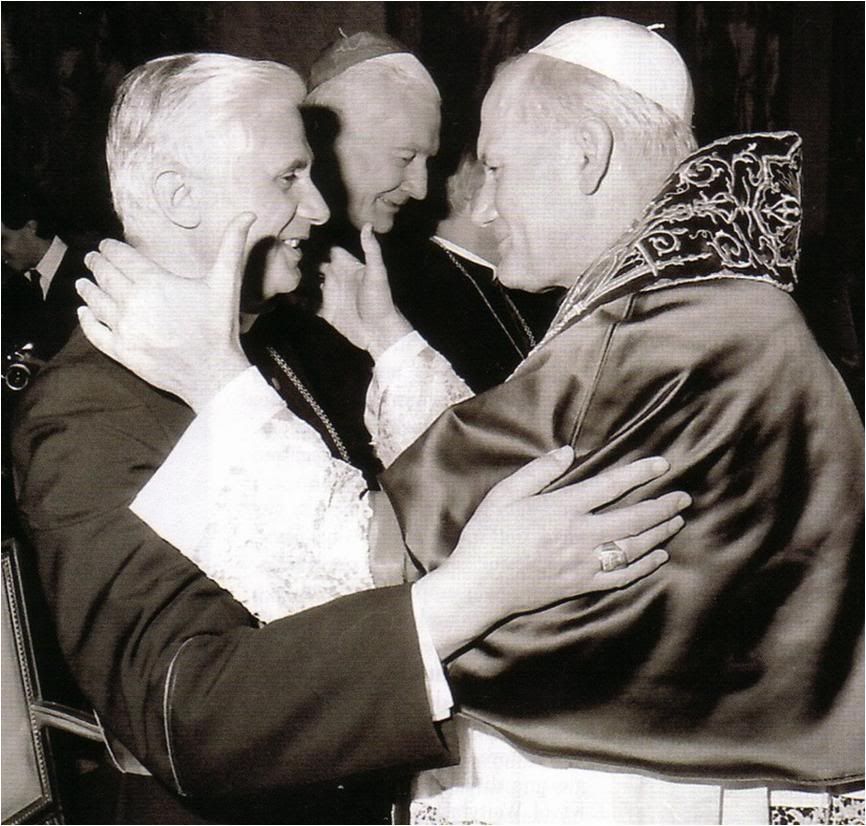 Thirty years ago today...
THE POPE'S DAY
Thirty years ago today...
THE POPE'S DAY
The Holy Father met today with
- Bishops of Ecuador (Group 2) on ad-limina visit. Address in Spanish.
- Participants in an international Congress promoted by the Pontifical Lateran University to mark
the 10th anniversary of John Paul II's encyclical Fides et ratio (Faith and reason). Address in Italian.
This afternoon, the Holy Father was scheduled to attend an advance screening of the film 'Testimony' based on
Cardinal Dsiwisz's memoir of John Paul II.
The Press office also released the text of the Pope's message to the United Nations Food and Agriculture
Organization (FAO) on the occasion of World Food Day today. Text in French.
It's the 10th working day of the Synod assembly.
(But since they have now broken up into working groups, I don't think the Pope will be taking part in this phase).
A news conference was held in the early afternoon to present the current Synod Assembly's
'Relatio post disceptationem' [Report after discussions] summarized in Latin to the assembly by
moderator Cardinal Marc Ouellet yesterday.
Participating were two of 3 delegate-presidents of the Assembly, Cardinal William Levada of the CDF,
and Cardinal Odilo Scherer of Sao Paulo; Cardinal Peter Turkson, Archbishop of Cape Coast (Ghana) and
president of the Association of Western African Bishops' Conferences, who is president of the Assembly's
information Committee; Mons. Luis Antonio G. Tagle, Bishop of Imus (the Philippines) and member of the
information committee; and Fr. Feederico Lombardi, Vaticna press director.
POPE TO BISHOPS OF ECUADOR:
'A mature laity can illuminate society'

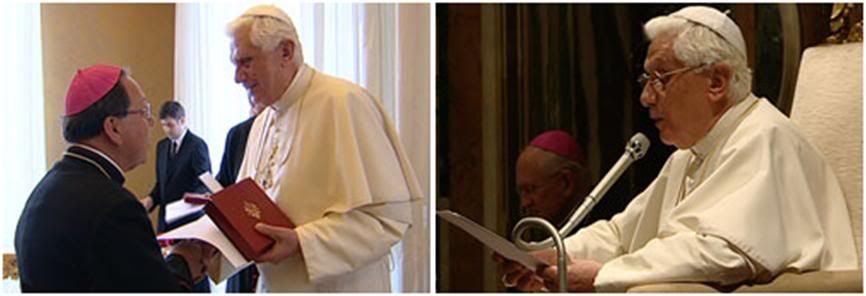
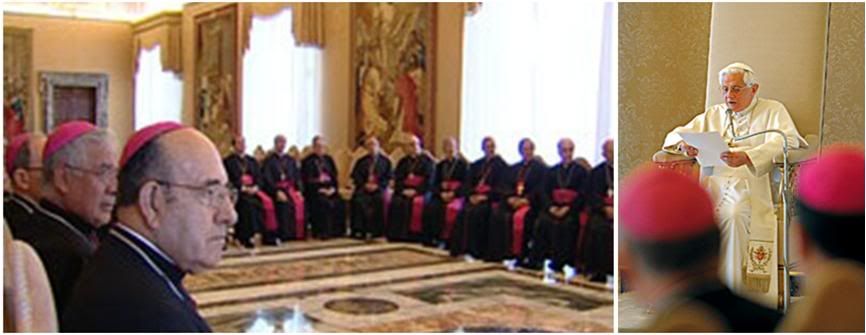
VATICAN CITY, 16 OCT 2008 (VIS) - Benedict XVI today addressed bishops from Ecuador, who are completing their "ad limina" visit.
He opened by reiterating his condolences for the recent death of Cardinal Antonio Jose Gonzalez Zumarraga, emeritus archbishop of Quito, the capital.
He then proceeded to his pastoral message.
"I note with satisfaction", the Holy Father went on, "that one of the pastoral initiatives you consider to be most important for the Church in Ecuador is implementing the 'great mission' identified by the Latin American Episcopate at Aparecida, Brazil. ... The call the Lord Jesus made to His disciples, sending them forth to preach the message of salvation and make disciples of all people, must be a constant theme of meditation and the raison d'etre of all pastoral activity for the entire ecclesial community".
"In order to face the many challenges of your mission, and in a cultural and social atmosphere that seems to forget the deepest spiritual roots of its identity ... it is necessary to make generous efforts to spread the world of God so that no-one remains without this indispensable spiritual nourishment, source of life and light".
The Pope recalled how this missionary task "depends particularly upon priests" and how, given the shortage of clergy in many areas of Ecuador, the prelates are "committed to involving all groups, movements and individuals" of their dioceses "in a wide-ranging and generous form of vocational pastoral care.
"These efforts", he continued, "must be accompanied by the greatest care in selecting seminarians and in their intellectual, human and spiritual formation. In this way ... they will be able to shoulder the demands of their future ministry with joy and a sense of responsibility".
"In this important stage of history, the Church in Ecuador needs mature and committed lay people who, with a solid doctrinal formation and a profound interior life, live their specific vocation of illuminating all human, social, cultural and political reality with the light of Christ".
Benedict XVI thanked the prelates for their efforts in "recalling the attention of society to those values whihc bring greater justice and solidarity to human life".
"Although the activity of the Church must not be confused with political concerns", he said, "it must, through reflection and moral judgements, offer its own contribution to the entire human community, also on those political questions that particularly affect human dignity".
The Holy Father concluded by calling on the bishops to dedicate particular attention to the charitable activities of their Churches, activities which must "express the merciful love of Christ, especially to people in need, the elderly, children, emigrants and to abandoned and mistreated women".
THE POPE'S MESSAGE FOR WORLD FOOD DAY
VATICAN CITY, 16 OCT 2008 (VIS) - Benedict XVI sent a Message to Jacques Diouf, director general of the United Nations Food and Agriculture Organization (FAO), on the occasion of World Food Day, an annual event organised by the FAO every 16 October.
The theme chosen this year - "World Food Security: the Challenges of Climate Change and Bioenergy" - "enables reflection upon achievements in the fight against hunger and upon the obstacles facing the FAO in the new challenges threatening the life of the human family"., wrote the Holy Father.
He underscored that "above all, we must undertake to illuminate the reasons that prevent authentic respect for human dignity. With the means and resources the world has at its disposal, it is possible to supply sufficient nourishment and to satisfy the growing needs of everyone".
"The incorrect management of food resources caused by corruption in public life and increasing investment in arms and sophisticated military technology, to the detriment of people's primary needs, has great importance", he added.
The Pope also pointed out that "an effective campaign against hunger, in order to confront climate change or to allocate agricultural production primarily to food, calls for much more than mere scientific studies. It is necessary, above all, to rediscover the significance of human beings in their individual and community dimensions".
"This reflects the need to build relations between peoples based on real and constant openness, to ensure that each country is able to satisfy the requirements of those in need, and to transmit the idea of relations founded on the interchange of reciprocal knowledge, values, rapid assistance and respect".
Benedict underscored the importance of "commitment to promoting effective social justice in relations among peoples", so that the economy may be oriented towards the distribution of the goods of the earth, "to their sustainable use and to the fair division of their benefits".
"One essential condition to increase levels of production and guarantee the identity of indigenous communities, as well as peace and security in the world", he concludes, "is to guarantee access to land, favouring agricultural workers and promoting their rights".
Pope says military spending
helps create food shortages

ROME, Oct. 16 (AP) -- The world has enough food to feed its growing population but many go hungry because of military spending, corruption and speculation, Pope Benedict XVI said Thursday.
Rich countries continue a "race for consumption" even as food becomes more scarce in poorer regions, the pope said in a message to the U.N.'s Food and Agriculture Organization on World Food Day.
"The means and resources that the world has today are able to provide enough food to satisfy the growing needs of everybody," Benedict told the Rome-based agency.
Benedict blamed food shortages on "feverish speculation" that drives up prices, along with "corruption in public life or growing investments in weapons and sophisticated military technologies to the detriment of people's primary needs."
The Pope's message was read at a ceremony held at FAO's headquarters, where leaders and experts renewed calls for an international commitment to fight world hunger.
Opening the ceremony, FAO's Director-General Jacques Diouf said only 10 percent of $22 billion (16 billion euros) that was pledged by nations this year to fight food shortages has so far materialized, mainly for emergency aid.
FAO said number of hungry people increased by 75 million in 2007 to reach a total of 923 million. Diouf says another 25 million people are expected to be forced into hunger this year.
 I couldn't access Avvenire's page-by-page display earlier, but here is their coverage of the main Church-related news today:
Remembering John Paul II
I couldn't access Avvenire's page-by-page display earlier, but here is their coverage of the main Church-related news today:
Remembering John Paul II
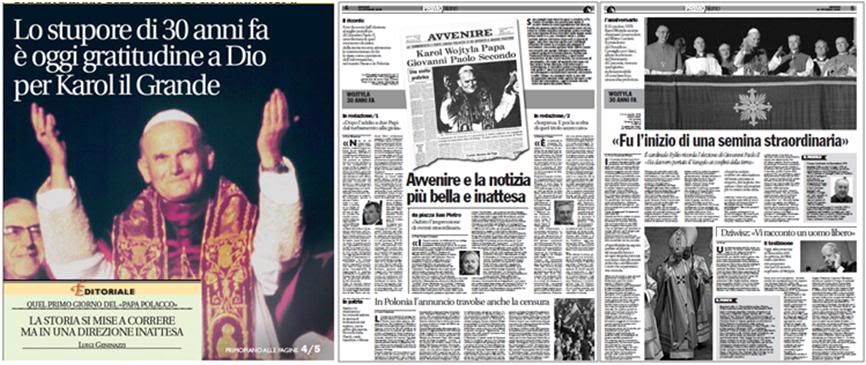 Front page-picture and editorial, and a two-page spread recalling the euphoria of Oct. 16, 1978, plus interviews with Cardinals Dsiwisz and Rylko. The front-page headline reads: 'The wonder 30 years ago, and today, great gratitude to God for Karol the Great'..
Front page-picture and editorial, and a two-page spread recalling the euphoria of Oct. 16, 1978, plus interviews with Cardinals Dsiwisz and Rylko. The front-page headline reads: 'The wonder 30 years ago, and today, great gratitude to God for Karol the Great'..
The General Audience of Wednesday
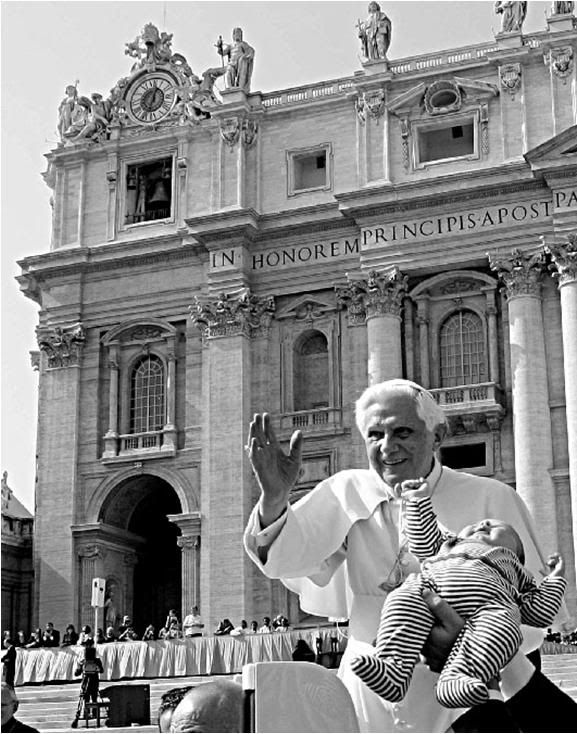
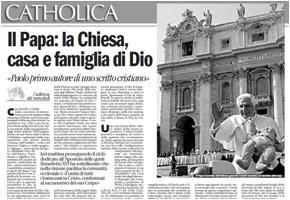 The report includes the entire text of the Pope's catechesis.
The Bishops' Synod and 'Fides et Ratio'.
The report includes the entire text of the Pope's catechesis.
The Bishops' Synod and 'Fides et Ratio'.
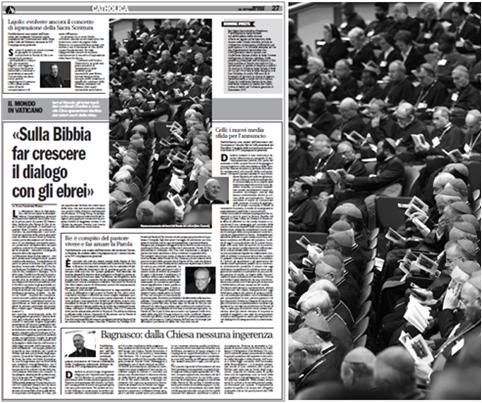
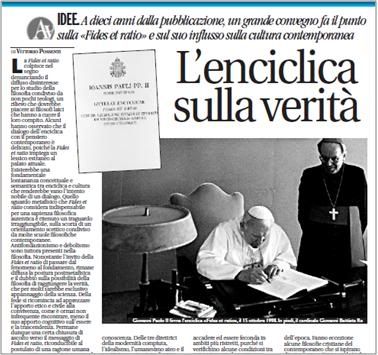 A full page on Synod reports, and a special report on Fides et ratio, John Paul II's landmark encyclical.
A full page on Synod reports, and a special report on Fides et ratio, John Paul II's landmark encyclical.